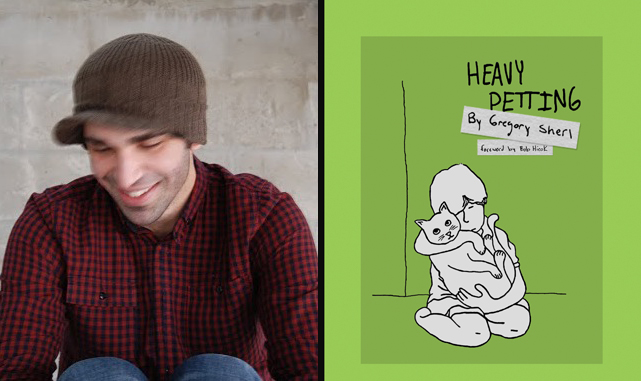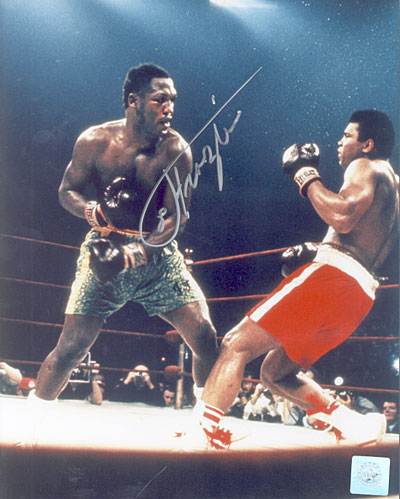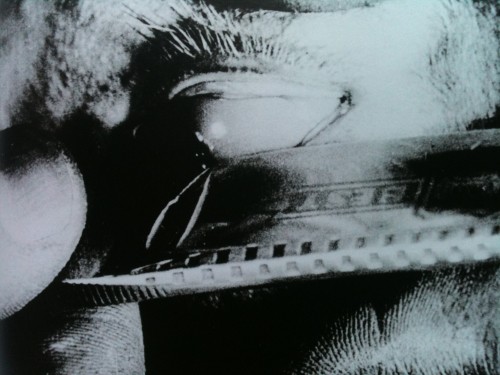I usually like seeing text and ideas stolen and incorporated in new texts. Often there is a clear intent, or the layering makes it interesting, even if more often you maybe don’t realize it was stolen. Though when students do it for papers it can seem like laziness, and often really is. Little, Brown just killed a “suspense” novel that they realized stole direct language from lots of classic mysteries, unacknowledged, including major stuff like Bond. Are there limits to acceptable “plagiarism”? What are they?
A Conversation With Gregory Sherl
Gregory Sherl is the author of the excellent poetry collection Heavy Petting (my review, here, at Diode). I’ve always admired the sensuality and openness of his writing so we talked about the way he exposes himself in his poetry, Ryan Gosling’s satin jacket in Drive, and the matter of fucking in poetry.
What is your obsession as a writer?
Trying to stop myself from being so desperately aware that I’m a writer. Or maybe my obsession is figuring out how to pay for healthcare when my only income comes from being an Adjunct English Instructor. Or maybe it’s me obsessing over obsessing about the fact that I need to apply for my MFA like today but not doing it because writing new poems is better than putting old poems together in a packet with some stamps on it. Or maybe it’s watching the doctor try to figure out the right cocktail of medication so I don’t sleep nineteen hours in one day. Or maybe it’s trying to watchFelicity in its entirety as quickly as possible (a little over two weeks, I believe). Or maybe these aren’t my obsessions as a writer but my obsessions as me but I’m a writer so I think it fits.
Thunk
True to his plan, arrogant and contemptuous of an opponent’s worth as never before, Ali opened the fight flat-footed in the center of the ring, his hands whipping out and back like the pistons of an enormous and magnificent engine. Much broader than he has ever been, the look of swift destruction defined by his every move, Ali seemed indestructible. Once, so long ago, he had been a splendidly plumed bird who wrote on the wind a singular kind of poetry of the body, but now he was down to earth, brought down by the changing shape of his body, by a sense of his own vulnerability, and by the years of excess. Dancing was for a ballroom; the ugly hunt was on. Head up and unprotected, Frazier stayed in the mouth of the cannon, and the big gun roared again and again.
And, you know, this. Whatever.
And could anyone point me to better next-day Kram (or same) writing about sports? RIP literary sports writing, like of the event, once the actual norm before the YELLING. YELLING is now sports reporting, eh? Get off my YAWN. Who writes very well about sports now? I ask you. I ask. I mean in Good Faith: I’ll read your answer.
RIP Joe Frazier.
{LMC}: Yelena Akhtiorskaya in Beecher’s #1
The editors of Beecher’s #1 should be applauded for picking fiction and poetry that are all remarkably consistent in structure and tone. This issue of Beecher’s values images over plot in the traditional sense. The pieces are usually quite short and aim to evoke a mood through the use of exquisite, concise, and deliberate writing. Basically, if you’re looking for sensitive stories about sad people in the suburbs having affairs, or speculative romps through alien lands, then this ain’t the journal for you.
The writing in Beecher’s is almost uniformly great and most of the pieces succeed at their goals. But this consistency could, somehow, work against the journal in the long run. I couldn’t read more than two or three entries in one sitting, and they’re short (most of the fiction is a page or two), because it all started to sound a little too much alike. The pieces are so similar to each other that I kept forgetting who the authors were. At times I’d think that I had already read a story, but then realize I was confusing it with another piece with a similar tone and feeling. For example, the lists and repetition in Joshua Cohen’s story, “The Rules (Gulf Version)” is very similar to the lists and repetition in Colin Winnette’s “Playing with Myself: A Series”—even the titles sound the same. John Dermot Woods’s flash fiction, featuring unique characters in unique, unsettling situations, is pretty similar to Alexis Orgera’s prose poems, which feature unique characters in unique, unsettling situations.
This observation isn’t meant to take anything away from the separate pieces. Orgera’s poems are some of the strongest in the journal, and Cohen is as dazzling as always. Perhaps this is a larger debate. Is it possible for a journal to be too consistent? When does a sustained effect move from intriguing to repetitive?
x-snatch 14
1. You should probably get the fuck off the chesterfield and grackle your flash fiction manuscript to The Rose Metal Press Sixth Annual Short Short Chapbook Contest. As you well know, RMP make books that are regal, complex, bebob and badass, all humped and hawking as they fly.
7. John Holten goes:
…the guys making Grand Theft Auto, today they’re real fictional realists.
2. Higher Education says:
3. John Jodzio goes:
I’m fifteen. According to every oncologist, shaman and tea leaf reader in the tri-state area, I’ve got between three and six months to live. Right now, I am wearing a blue shirt that says “Carpe Diem” but I’ve scratched off the ‘e’ and the ‘m’ so the shirt reads “Carp Die.”
4. BOOKFORUM says some writers are not tickled sunny by James Woods:
Jonathan Lethem (8 years later!): Wood is a critic whose better angels are at the mercy of his essentialist impulses.
Allan Hollinghurst: But actually, when he got to the bit when he was imagining how I might write something, it just seemed so pathetic that I stopped taking it seriously.
Hey has anyone else read The Swimming-Pool Library? That book be glow.
13. And Amy Lawless says: “My knees buckle from love and what is going on in the x-snatch.”
14. As a writer, do you like or hate theme issues of literary magazines? As a reader, do you like or hate theme issues of literary magazines?
Now Available: David Lynch’s solo album Crazy Clown Time
Pitchfork says: “Unfortunately, none of these songs actually feel like songs. Only a few have choruses or any significant chord changes. Instead, they’re set pieces, which makes sense: Lynch’s films often seem to be more about luxuriating in his atmosphere than about following his plots, and that carries over to this music as well.”
Paste says: “What a mess…Crazy Clown Time, recorded in Lynch’s personal studio with engineer Big Dean Hurley, isn’t exactly fart-blank, but this visual master shouldn’t quit his day job.”
The Atlantic says: “Lynch dares to disturb, and that requires a bravery that cares not for our comfort, but for the integrity of the art itself.”
NPR says: “It sounds absurd, yes, and Crazy Clown Time … won’t be for everyone. But you can be sure that no two people will come away with the same experience of this record, and there aren’t many artists working today who can make that claim.”
ARTIFICE 4 RELEASE / APOCALYPSE / LETTERS FROM THE LIVING TO THE DEAD
“Kafka Writes to Romeo / Romeo Writes Back,” by Catherine Gammon; video by Meghan Lamb
Artifice Magazine is releasing its fourth issue in Chicago this weekend
There will be readings and short films and disembodied voices
If you are in or nearby Chicago we would love to see you there
Here are the details:
Elegant Mr. Gallery
1355 N Milwaukee Ave, Chicago
November 12
8 to midnight
Here is where you can find our fourth issue, otherwise
A Survey of 90s + Early-Internet Love Poetry

Prufrock revisited

In 1919, Marcel Duchamp drew a mustache on Mona Lisa and titled it “L.H.O.O.Q.,” phonetically Elle a chaud au cul, or “she has a hot ass,” and more loosely, “there is fire down below.” He made multiple versions, including one called “L.H.O.O.Q. Shaved”; that her mustache was not shaved directs our attention elsewhere. It is a cynical piece, as with most of his work, though if one considers the fury of cameras as cicadas coming out in the Louvre, their masters’ faces sharing the frame with hers, then maybe that’s warranted. In 2011, Urban Outfitters would sell a sort of non-functional shade (Sunstache, $8.00) adorned with a plastic mustache, mostly a gag gift. Its wearers would be seen going to or coming back from a party, ostentatiously on public transportation in that loud oblivious yet confident twenty-somethings manner, saying to the world #toomuchfreedom. The one time I went to the Louvre, I waited in line for three hours while the soft balm of French spoken by young girls behind me inspired me to “hold on” a little longer for the fleshy canvases awaiting inside. To render light loyally finding the full contour of an arse ends the argument of what is art. That night, I ate a crepe along the Seine, gazed up at Notre Dame, and felt an odd bulge growing on my back; some hours later, three Irishmen would find me in our hostel room, on the top bunk, another odd bulge growing from under the sheets as I imagined the slender pale hands which had made my crepe, reconfiguring each finger around my poetry. I was sure to peek, and did, inside the Mona Lisa room for good measure, of grave responsibility almost. Her smile could only flicker in between mounds of black asian hair in front of me, the entropy of a million languages as a car bomb under the Tower of Babel. In the room the asians come and go, talking of Michelangelo (which rhymes better than da Vinci). I’ve always wondered where that winding road past her right shoulder leads to, ideally a monk’s hut, if we consider the asian landscape-y vibe, paper light and flecked with ink. “Let us go then, you and I,” is the solicitation to come back to my hostel which I never used. She handed me the crepe, said voila and smiled. And should I then presume? And how should I begin?




